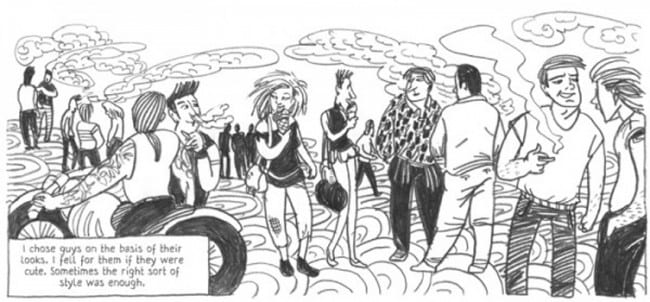The cover of Today is the Last Day of the Rest of Your Life commands attention. The title’s stark white graffiti-style letters, cast in bold relief against a red backdrop, announce themselves above the hypnotic gaze of a wild-haired cartoon version of Ulli Lust, beckoning us in. It’s a great way to kick off this virtuoso 464-page graphic novel, recipient of the 2011 “Revelation” prize at Angoulême, available at last in English translation courtesy of Kim Thompson (RIP). Early in the story, Lust relates a childhood revelation she had when her younger sister died suddenly; after her initial terror of suffering the same fate, young Lust ultimately decides to make living "as if every day was my last” her motto, her raison d’être. The cover portrait beautifully captures her approach to everything that follows.
Thus begin her adventures as a 17-year-old Austrian punk rock girl ambling her way across Italy in the summer of 1984 with her newfound friend in tow, a tall, gangly girl named Edi. With no money or passports they forge ahead by sheer force of will, armed only with the invulnerability of the young and rebellious. Though Lust’s youthful exuberance and energy are severely tested by the inevitable pitfalls an attractive young woman will encounter hitchhiking in a country bound by traditional (i.e. highly sexist) cultural mores and traditions – and by the personal betrayals of certain fair-weather friends – this is no glib Live-and-Learn morality tale. One of the reasons the book is so successful is that Lust let the experience gestate over years, allowing for a certain distance and detachment. She captures perfectly and without judgment the complex social, cultural, and personal maelstrom she willingly entered into that summer, offering readers a wonderfully vicarious thrill in the process - especially readers like me, whose travelogues are generally limited to the “what I ate that time I went to Reykjavik” category.

As the girls make their way from Naples to Verona in the first leg of their odyssey, the mood is generally festive. The travails of hiking their way through fields of scratchy nettles or having to deal with an unfortunate case of crabs are related in a lighthearted manner. Both travelers are also cheerfully amoral: they are not above stealing petty cash or using their feminine charms to hook up with seemingly always-available male admirers in order to get a free meal or sleep in a comfortable bed for the night. As they make their way further south, however, the attentions of men take a much darker edge and the extreme Madonna/Whore sexism of the region grows ever more threatening and dehumanizing. Lust, who has been separated from Edi, must fend for herself in this bewildering culture. She describes in harrowing detail the psychic and, ultimately, physical rape she endures: “These guys wouldn’t take 'no' for an answer. They expected it. A woman who said 'no' was a decent woman. It was his mission to persevere, to flatter her and maintain bodily contact, until the woman succumbed to his mighty male scent.” The trap tightens when Lust finally reconnects with Edi, only to fall into the clutches of a gaggle of mafiosi. It is here she finally grasps the depths of Edi’s pathological need for male attention, which ultimately leads to the dissolution of their friendship and the beginning of the end of her long summer.
In between her many tussles with predatory men (not confined to Southern Italy), her scrapes with the law, her wary-but-willing experimentation with heroin and other shenanigans, Lust offers quite useful and often fascinating facts about various regions and subcultural traditions of Italy, many of which were critical to her survival. For example, Andreas, a man they befriend in Rome, persuades her that panhandling is not only accepted but also rather approved of, explaining that “the contrast between rich and poor is so huge in Rome, it’s considered common courtesy to give an alm.” Lust gamely gives it a go and meets with success. In these instances the story has the feel of a Fodor’s guide for the impecunious vagabond.

None of this would succeed as well if the story weren’t visually appealing. Lust’s two-color cartooning throughout is simply outstanding. She demonstrates as much facility with character design and body language as she does rendering cityscapes, train stations, landmarks like Rome’s Spanish Steps, or the sweeping grandeur of the Italian countryside. The sheer amount of effort that went into each panel, each page, manifests the wide-ranging, richly detailed scope and nuance of the book. You sense that she wanted to leave absolutely nothing of the experience out. Still, there’s never a labored feel to her work – her line is smooth and fluid, with a delightfully expressive, even tossed off quality.
In the end, when Lust is safely back at home with her highly disapproving, uncomprehending parents, there is a sense of genuine diminishment, mixed with relief. As Lust states, “I fucked up a lot, and was really, really lucky” – lucky not only to have survived several dangerous, traumatic experiences, but also to have somehow thrived, realizing fully the steely, primal resilience at her core. She muses, “I think it’s cooler to get by without money… to not need anything.” She has also in that short time gained a lifetime of hard-won experience and adventure to revel in, examine, and pass on. The final page of her epic makes powerfully plain that Lust’s inner runaway child, having been unleashed in full force, is only temporarily subdued, pretending dormancy, awaiting her chance to reemerge and fully assert her place in the world once more.







